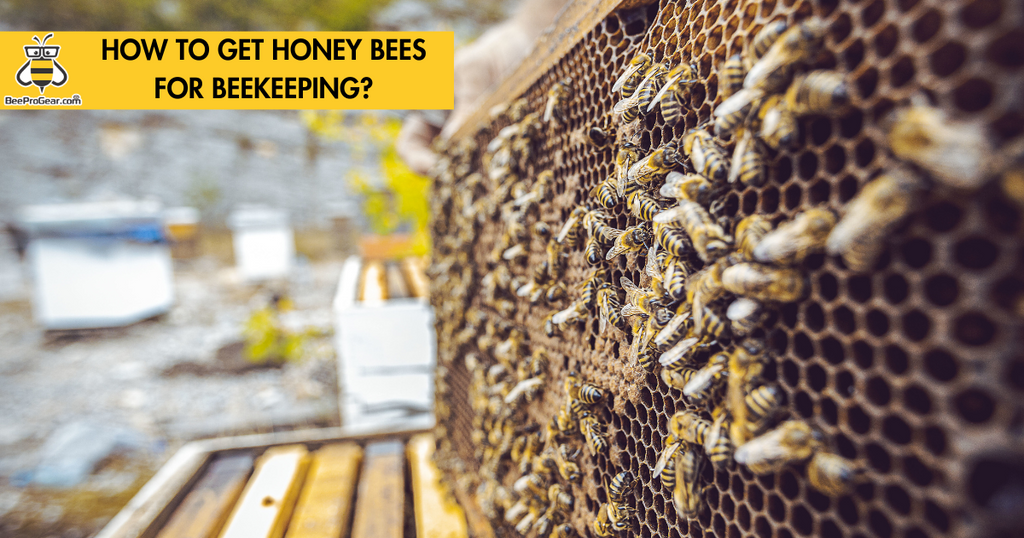No Products in the Cart

One of the most common questions among aspiring and seasoned beekeepers alike is, "Where should I get bees?" With various options available, each accompanied by its own set of advantages and considerations, the decision can feel overwhelming. In this guide, we'll explore the different ways to acquire bees, including package bees, nucleus hives, full-sized hives, swarms, and local sources, providing insights into what to expect and factors to consider for each option.
Package bees consist of a predetermined weight of bees (typically around 3 pounds) and a mated queen. These bees are usually shaken into a container, packaged, and then shipped to beekeepers. The advantage of package bees is their convenience; they're readily available and easy to install in a hive.
What's in a Package of Bees?
A package typically contains worker bees, a mated queen, and a sugar syrup feed to sustain them during transit.
How Much do Package Bees Cost?
Package bees are often one of the most affordable options for acquiring bees, with prices varying based on factors such as bee species and supplier location.
Pros and Cons of Package Bees:
Package bees provide a quick and straightforward way to start a colony, but they may take longer to establish compared to other options like nucleus hives.
Nucleus hive or nucs, are small colonies of bees that include frames containing brood, honey, pollen, and a mated queen. Nucs are typically more established than package bees and can start producing honey sooner.
What's in a Nucleus Hive?:
A nucleus hive typically consists of several frames of bees, brood, honey, pollen, and a mated queen.
How Much do Nucleus Hives Cost?:
While nucs may be more expensive upfront than package bees, they're often considered a good value due to their readiness to expand and produce honey.
Nucleus Hives as a Good Value:
Nucleus hives offer a head start in beekeeping and can be a wise investment for those who want to skip the initial stages of colony establishment.
Full-sized hives are complete colonies housed in hive boxes with multiple frames. These colonies are already established and may include honey reserves.
What's in a Full-Sized Hive?:
A full-sized hive includes worker bees, brood, honey, pollen, and a mated queen, all housed within a hive box.
How Much do Full-Sized Hives Cost?:
Full-sized hives are generally more expensive than package bees or nucs due to their established nature and potential honey reserves.
Swarms are natural colonies of bees that have split from their original hive and are searching for a new home. While acquiring a swarm may be cost-effective, they're not recommended for beginner beekeepers due to their unpredictable nature and potential health risks.
What is a Swarm of Bees?:
A swarm consists of thousands of worker bees and a queen in search of a new nesting location.
What's in a Swarm?
Swarms contain worker bees, a queen, and sometimes honey reserves.
How Much do Swarms Cost?
Swarms are often acquired for free or at a low cost, but their unpredictable behavior and potential disease risks make them unsuitable for beginners.
The Reasons Swarms Aren't Great for Beginner Beekeepers:
Swarms require expertise to manage and may introduce diseases or aggressive genetics into your apiary.
Experienced beekeepers may attempt to lure swarms into hive boxes using techniques such as swarm lures, pheromones, or bait hives. However, this method requires patience and skill.
Cut outs involve removing established colonies from structures like buildings or trees. While they can be an option for acquiring bees, they require expertise and may not be suitable for beginners. Instead, consider finding local beekeepers or beekeeping associations where you can purchase bees or get advice on acquiring them.
Many suppliers offer the option to have bees shipped directly to your location. This can be a convenient way to acquire bees, but be sure to choose a reputable supplier with a track record of delivering healthy bees.
When deciding where to get your bees, consider factors such as cost, convenience, and the level of experience required. Whether you choose package bees, nucleus hives, or another option, remember to prioritize the health and well-being of your bees. With the right start, you'll be well on your way to a fulfilling beekeeping journey.